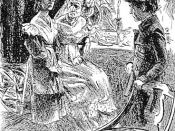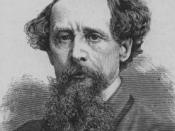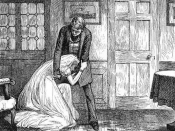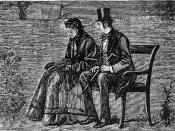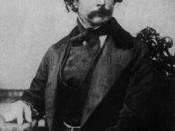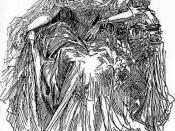I. Introduction: Great Expectations, by Charles Dickens, was first published in August 1860 as a story in serial format (where some of the novel is printed every week.) The book is set in London in the nineteenth century and revolves around the life of a young boy turned man Pip, who is raised by his sister and his brother-in-law Joe. Throughout the novel we see Pip grow up and his relationship with Joe, Miss Havisham, Estella and Mr. Jaggers teach us about a few things that are important in our lives. It teaches us to look past social class, as Pip does not think he is good enough for Estella, not knowing that Estella herself is of lower class than Pip himself. Great Expectations also reveals to us about ones character, or ones lack there off. Character is the same thing as ones identity, and what we find is that the characters who are stubborn are the ones who end up changing, while the characters who do seem to change stay true to themselves.
Pip, the main character in the book, thinks that he changes through the book, and while it is true that he does grow up and mature throughout the book, he is the same Pip that we meet in the beginning of the group. Dickens shows us through Pip and Estella how love is and how love is not, and more than that he shows us a glance at what life was like in the 1900's and what it was like for classes to come together. This book stands out for its time in that it conveys the emotions of love, hatred, and despair. Great Expectations, by Charles Dickens, is a book that encompasses many themes such as social class and identity to show us how to live our lives better and in doing so becomes a novel for the ages, one that many can enjoy and learn from.
II. Critical Analysis: John Foster, who was a Victorian biographer, historian, and critic, writes this critical article. The essay was written in 1874 and is in favor of Dickens work. Foster mind-set is that Great Expectations is one of the greatest works ever, as he says "his right to the front rank among novelist."ÃÂ He says that Great Expectations is a portrait of Charles Dickens childhood, and it is, as Dickens has said so himself. Foster also points out the fact that Pips life is changed because of good luck. His apprenticeship, which he was not to wary of to begin with, got him his stint at the Havisham house, where he met the love of his life, Estella. It is because of Joe, who Pip is ashamed of when he moves to London and is part of the elitist club that Pip is able to succeed in life. Foster also seems to have a love with the way Dickens paints a picture, as he describes the Cooling Castle and the desolate church. Dickens definitely is one of the masters of detailed imagery, and word choice is excellent. John Foster is also a big fan of Magwich, whom many are opposed to until the end of the novel when they find out that he, not Miss Havisham, is Pips benefactor. He loves the way Magwich risk his well being so that he can see how Pip is doing as a gentleman. Magwich is in a way Pips father, and he wants to know how his boy is doing. Foster seems to know a lot of what Dickens went through to get this book as accurately as possible, as he explains how Dickens rented a ship and filled it with guest to see what the results of something in the water was. Someone with that kind of knowledge is bound to be a fan of ones work. Once again, someone with a love for Dickinson would know this book, not just appreciate it. The essay does seem to be basis, for he never criticizes Dickinson for his writing of Great Expectations, so as far as the real quality of the novel to others as a whole, you would have to read others, not just this one, to know the literary value of this novel. I for one agree with John Foster that this is one of the greatest books of the 19th century, because it is a book which teaches a lot of things in life and does not just focus on one topic. Many different people can read it and everybody can still learn something from this novel.
III. Style: Charles Dickens is one of the premier writers of the 19th century and uses some stylistic techniques that make his work easy to identify. One of these techniques is name-dropping, in which in passages he spells out the name of certain people at least once and maybe up to three times in the same passage. While this might be deemed tedious and boring to read, what it does is it makes the reader familiar with the character and he comes to know the character on a full name basis. In the passage "At length, as I was looking out at the iron gate of"æ. without saying anything to me, addressed himself to his followers."àDickens drops the names of 3 people 4 times, which makes the reader feel closer to the story. This also helps Dickens make Pip appear more prestigious, and therefore of a higher class. Dickens word choice is another technique that makes the story even more authentic and helps bring about the division of classes in the novel. The narrator not only speaks in a colloquial language for the day, but in the language of the upper class of the day as well. Miss Havisham and Estella both speak in tongues of the wealthy class, while Pip does not even start to learn the language of the upper class until he is sent to London to become a gentleman. In the beginning of the novel, Pip level of diction is very limited and his word choice is simple, as is Joes and Miss Joe. They come from a poor background and are not educated enough to be able to speak of the tongue that Miss Havisham can. This separation of diction makes for a separation of classes, as you can tell by reading the novel in certain places who is of stature and who is not. Charles Dickens uses a very stylistic approach to writing in that he is very descriptive of his images. He will describe a person for half a page to convey to the reader what the character is like and how he/she feels. The reality of it is that Dickens's word use is sometimes unnecessary and he has logic behind his wordiness. Back when Great Expectations came out, it came out in serial form, meaning that it came out every week/month at a time. The way they paid authors back then was by word, so what Dickens did was be very descriptive and he was paid more than your average author.
Dickens uses of complex words made the book seem hollow and empty at times as well. This made the differences between classes even greater. When Miss Havisham spoke in such complex language, you felt that she was cold and that she had no feelings inside (although she really didn't), yet when Pip talked in such simple terms when he was younger, you felt closer to him and it made you accept him more, even when he was mischievous. All in all, the stylistic techniques that Charles Dickens uses helps the themes of social class come out off the novel, and make it one of the greatest novels of the 19th century.
IV. Themes: There are many themes in Great Expectations by Charles Dickens, and two main ones are social class and family structure. Social class plays a main role in the movie, as Pip is from the lower class and desires to be off the upper class so that he may be with the love of his life, Estella. To become part of the upper class, Pip must become a gentleman and educated man. Pips brother in law and his sister are both of the lower class and when Pip becomes a member of the upper class, he turn his back on the man who loved him so, Joe. Early in Pips life, he admired Joe in whatever he did, it make no difference what Joes class status was. It is not till later when Pip learns that the world cares about class that Joe's status matters to Pip. Even though it was Joe's apprenticeship that got him his visit to the Havisham house to play with Estella and it was Joe who gave Pip his opportunities in life, it was Joe who was not forgotten but who was turn away. What Pip does not know is that Estella is Magwich's daughter and therefore is of lower class than Pip or Joe. Pip also learns about class from Estella, who in calls Pip "common"ÃÂ, and Pip is freighted that he might be common. What Dickens tries to teach us through this is that it doesn't matter what class you are part off, it only matters what you are on the inside, and what people see in you, not what people label you. Another theme that Dickens brings out is family structure. Great Expectations is a biography of sorts for Dickens in that it explores his childhood in this novel and other such as Oliver Twist. The fact that Pip is an orphan makes it even truer, since Dickens himself was an orphan. We see some strong ties between Joe and Pip, as Joe tells Pip that he will love him no matter what happens, and this turns out to be true since when Pip turns his back on Joe, Joe still loves him and takes Pip back when he comes back to him. Pip wishes to find a family so hard that he attaches to anybody that he considers friendly to him. He became friends with Miss Havisham almost instantaneously even though she was not as outgoing and fell for Estella the moment he laid eyes on her even though she wrote him off. Dickens shows us that it is family who is there for you when you need someone to help you in your bad times, not your friends, unless they are your best friends, but it is family who will stay with you until you are on your feet again and think nothing of helping you. Magwich is another character in the novel that wants family. Since Magwich lost his family, he looks for a family and ends up being Pips benefactor. He lost Estella when he went to jail, and feels so attached to Pip that he breaks out of jail to see how Pip is turning out in becoming a gentlemen. Family is what matters.
V: Conclusion: Great Expectations by Charles Dickens is a great novel that anybody over the age of fifteen will enjoy due to its vast themes of life and what it can teach you. Although the wordiness might make a few people leave, those who stay through the book is to be treated to one of the best books by Dickens, period. The themes of social class and family structure are so universal that those two themes cover everybody in this world. Pip, is Dickens, and he invites us to look at his life, does everybody ask you to look at their lives, Dickens does.
